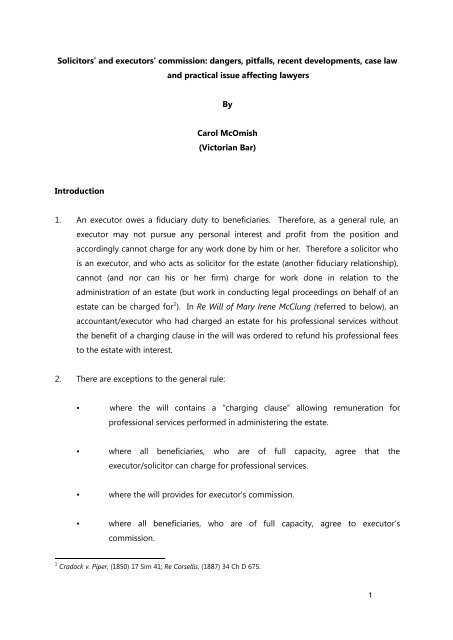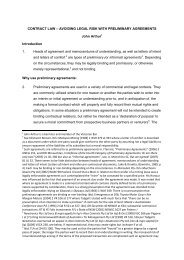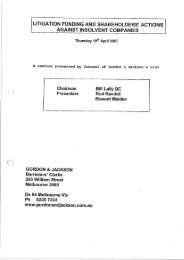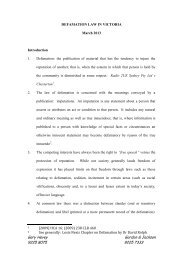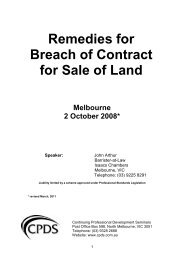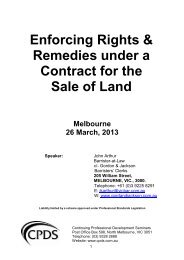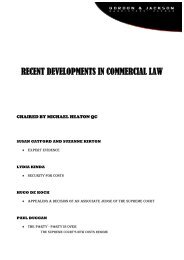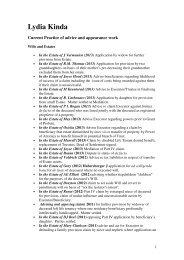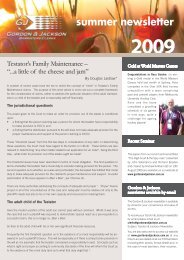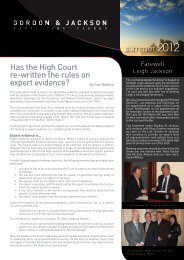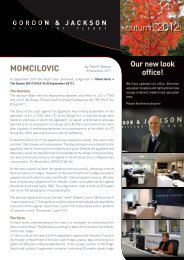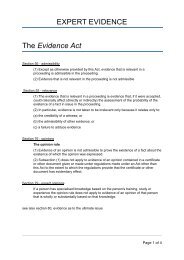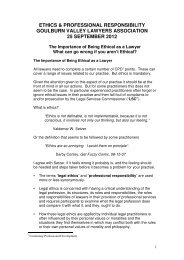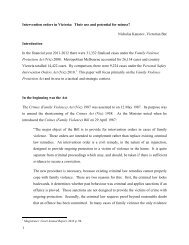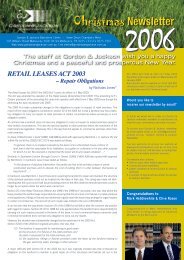and executors' commission - Gordon & Jackson
and executors' commission - Gordon & Jackson
and executors' commission - Gordon & Jackson
Create successful ePaper yourself
Turn your PDF publications into a flip-book with our unique Google optimized e-Paper software.
Solicitors’ <strong>and</strong> executors’ <strong>commission</strong>: dangers, pitfalls, recent developments, case law<br />
<strong>and</strong> practical issue affecting lawyers<br />
By<br />
Carol McOmish<br />
(Victorian Bar)<br />
Introduction<br />
1. An executor owes a fiduciary duty to beneficiaries. Therefore, as a general rule, an<br />
executor may not pursue any personal interest <strong>and</strong> profit from the position <strong>and</strong><br />
accordingly cannot charge for any work done by him or her. Therefore a solicitor who<br />
is an executor, <strong>and</strong> who acts as solicitor for the estate (another fiduciary relationship),<br />
cannot (<strong>and</strong> nor can his or her firm) charge for work done in relation to the<br />
administration of an estate (but work in conducting legal proceedings on behalf of an<br />
estate can be charged for 1 ). In Re Will of Mary Irene McClung (referred to below), an<br />
accountant/executor who had charged an estate for his professional services without<br />
the benefit of a charging clause in the will was ordered to refund his professional fees<br />
to the estate with interest.<br />
2. There are exceptions to the general rule:<br />
• where the will contains a “charging clause” allowing remuneration for<br />
professional services performed in administering the estate.<br />
• where all beneficiaries, who are of full capacity, agree that the<br />
executor/solicitor can charge for professional services.<br />
• where the will provides for executor’s <strong>commission</strong>.<br />
• where all beneficiaries, who are of full capacity, agree to executor’s<br />
<strong>commission</strong>.<br />
1 Cradock v. Piper, (1850) 17 Sim 41; Re Corsellis, (1887) 34 Ch D 675.<br />
1
• where the Court orders that an executor is allowed <strong>commission</strong>, pursuant to:<br />
• s. 65 (1) of the Administration <strong>and</strong> Probate Act 1958, which provides<br />
that:<br />
It shall be lawful for the Court to allow out of the assets of any<br />
deceased person to his executor administrator or trustee for<br />
the time being such <strong>commission</strong> or percentage not exceeding<br />
Five per centum for his pains <strong>and</strong> trouble as is just <strong>and</strong><br />
reasonable.<br />
• the inherent jurisdiction of the Court 2 (<strong>commission</strong> is not limited to<br />
5%).<br />
The percentage of <strong>commission</strong> (payable on assets realized) is selected by the Court<br />
after an assessment of the executor’s “pains <strong>and</strong> trouble” 3 . “Pains” relates to<br />
responsibility, anxiety, <strong>and</strong> worry, <strong>and</strong> “trouble” relates to work performed by the<br />
executor in the administration of the estate 4 .<br />
3. An executor is entitled to reimbursement of out of pocket expenses, whether pursuant<br />
to any right of indemnity in the will, or the statutory indemnity given by s. 36(2) of the<br />
Trustee Act. The statutory indemnity only relates to expenses properly incurred in the<br />
administration <strong>and</strong> distribution of the estate; whether or not expenses can be said to<br />
have been properly incurred is determined in each case on the particular facts.<br />
Solicitor/executors<br />
4. Obligations under the LIV Professional Conduct <strong>and</strong> Practice Rules 2005.<br />
Rule 10 provides that a solicitor drawing a will appointing him or her or associated<br />
persons (such as the firm or business partners) as executor must inform the client in<br />
writing before the client signs the will:<br />
• of any entitlement of the solicitor or associated person to claim<br />
<strong>commission</strong>, <strong>and</strong> that the client could appoint as executor a person who<br />
might not claim <strong>commission</strong>.<br />
2 Nissen v. Grunden (1912) 14 CLR 297; Re Moore [1956] VLR 132.<br />
3 Hawkins v Barkley-Brown <strong>and</strong> Anor [2010] NSWSC 4.<br />
4 Vance, Executor's Commission, at pp. 127 & 187.<br />
2
• of the inclusion in the will of any provision entitling the solicitor or<br />
associated persons to charge legal costs in relation to the administration of<br />
the estate.<br />
5. Observations of Evans M in Re Will of Mary Irene McClung 5 .<br />
The occasion on which a solicitor receives instructions for the preparation of a<br />
will for a client by a solicitor can place the solicitor on the horns of a dilemma<br />
if the solicitor is asked to act as executor under the will. It is not a position<br />
which the solicitor should seek. It is reasonable for the solicitor to preface<br />
acceptance with a requirement that the will contain a charging clause in<br />
relation to any legal services performed for the estate. To request inclusion of<br />
a charging clause so wide as to enable the solicitor to charge for all<br />
executorial functions is not reasonable unless the solicitor ensures that the<br />
will provides that such charges may be made in lieu of any entitlement to<br />
<strong>commission</strong> <strong>and</strong> the full import of the clause is explained to the client.<br />
The solicitor is under a duty to inform the client seeking his services as<br />
executor that he would be entitled to make a claim for <strong>commission</strong> for doing<br />
so, as to the maximum rate of <strong>commission</strong> which could be charged <strong>and</strong> the<br />
possible burden such <strong>commission</strong> may impose both on the corpus <strong>and</strong><br />
income of the estate.<br />
Given the very real potential for a conflict arising between the interests of the<br />
client <strong>and</strong> the interests of the solicitor on such an occasion, it would be<br />
preferable that solicitors declined to act as executors. At the very least, the<br />
solicitors code of conduct should provide very clear guidelines as to the<br />
proper course of conduct on such an occasion <strong>and</strong> require the provision of<br />
written advice in relation to the decision to appoint a solicitor as executor.<br />
Charging Clauses<br />
6. An example of such a clause:<br />
Any executor <strong>and</strong> trustee being a solicitor or other person engaged in any<br />
profession or business may act in a professional capacity <strong>and</strong> shall be entitled<br />
to charge <strong>and</strong> to be paid all professional <strong>and</strong> other charges for any business<br />
time expended or acts done by him or her, his or her firm, or his or her<br />
company, in connexion with the administration of my estate <strong>and</strong> the trusts<br />
hereof, including acts which an executor or trustee not being in any<br />
profession or business could or might have done personally.<br />
5 [2006] VSC 209 at [34]-[36].<br />
3
7. This typical “extended charging clause” authorizes a solicitor/executor to charge for<br />
work done of a professional nature, <strong>and</strong> of a non professional nature. Costs for work<br />
of a “professional nature”, referred to in McClung as work that “required the exercise of<br />
legal skill <strong>and</strong> judgement”, in obtaining a grant of probate are scale costs <strong>and</strong><br />
prescribed by Rule 9.01 of the Administration <strong>and</strong> Probate Rules, <strong>and</strong> additional charges<br />
that may be made in relation to fees, charges or expenses reasonably incurred, <strong>and</strong> for<br />
special or unusual work under R. 9.03 (in accordance with Practitioners Remuneration<br />
Order). Work of a “non professional nature” is work capable of being done by a lay<br />
executor, described in McClung as “executorial duties which could have been<br />
performed by a reasonably intelligent adult unburdened by legal training”. Non<br />
professional work cannot be charged for at professional rates 6 , <strong>and</strong> cannot be charged<br />
for at all unless it is expressly permitted by the charging clause. Non professional<br />
charges are open to investigation by the beneficiaries, <strong>and</strong> they should be made on an<br />
appropriate costs scale (such as the Practitioners Remuneration Order), a solicitor’s<br />
attendance charge not being reasonable in the case of routine office work of a clerk 7 .<br />
8. A solicitor/executor has four options with such a clause:<br />
• not to charge for either professional or non professional work at all <strong>and</strong> claim<br />
<strong>commission</strong> instead (the Court will take professional work performed in to<br />
consideration in fixing <strong>commission</strong>, <strong>and</strong> it may be a reason for increasing the<br />
allowance of <strong>commission</strong> 8 ).<br />
• to charge for professional work only <strong>and</strong> claim <strong>commission</strong>.<br />
• to charge for both professional <strong>and</strong> non professional work <strong>and</strong> not claim<br />
<strong>commission</strong>.<br />
• to charge for both professional <strong>and</strong> non professional work <strong>and</strong> claim<br />
<strong>commission</strong> as well.<br />
6 Estate of D A Lindsay [2004] NSWSC 575 at [8]-[9], Hawkins v Barkley-Brown <strong>and</strong> Anor [2010] NSWSC<br />
48 at [26].<br />
7 Vance, p. 144<br />
8 Re Craig, (1952) 52 SR (NSW) 265<br />
4
The option selected will depend on things such as the size of the estate, the amount of<br />
work that has been involved, <strong>and</strong> difficulties encountered in the administration of the<br />
estate.<br />
9. Charging for professional work will usually diminish the amount of <strong>commission</strong> that<br />
would otherwise be awarded if no such charge were made, but it does not necessarily<br />
result in no <strong>commission</strong> being awarded.<br />
10. A solicitor/executor would usually charge for both professional <strong>and</strong> non professional<br />
work <strong>and</strong> not claim <strong>commission</strong> in uncomplicated administrations where any award of<br />
<strong>commission</strong> would be unlikely to exceed the amount charged for non professional<br />
services. An application for <strong>commission</strong> by a solicitor/executor was dismissed in<br />
McClung 9 , Evans M finding that the executors’ pains <strong>and</strong> trouble had been rewarded by<br />
charges made for both professional <strong>and</strong> non professional services.<br />
11. If a solicitor/executor elects to take the benefit of an extended charging clause, <strong>and</strong><br />
charges for professional <strong>and</strong> non professional work <strong>and</strong> claims <strong>commission</strong>, the nonprofessional<br />
charges must be taken into account in fixing the quantum of <strong>commission</strong>,<br />
so that the estate does not pay twice in respect of the same work (“double dipping”) 10 .<br />
Professional fees<br />
12. The solicitor/executor is only entitled to reasonable legal costs. He or she has a duty<br />
to read bills of costs rendered by his or her firm or other solicitors <strong>and</strong> satisfy himself or<br />
herself that the costs are properly chargeable to the estate. Evans M, in McClung 11 ,<br />
found that that was not possible on a simple reading of bills in summary form, <strong>and</strong><br />
stated that it would have been desirable for the solicitor/executor there to have<br />
prepared itemised bills of costs that were capable of proper evaluation by the<br />
accountant co executor. The solicitor/executor had rendered bills to the estate that<br />
were in summary form <strong>and</strong> had not distinguished between professional <strong>and</strong> non<br />
9 [2006] VSC 209<br />
10 Vance, pp. 37, 143-144.<br />
11 at [16] & [17].<br />
5
professional work. In Atkins v Godfrey 12 <strong>commission</strong> was reduced where the executor<br />
had paid legal fees without scrutinising them <strong>and</strong> the fees had subsequently been<br />
partially refunded after taxation.<br />
Commission clauses <strong>and</strong> agreements for <strong>commission</strong><br />
13. An example of a common <strong>commission</strong> clause:<br />
I authorize my trustees proving my will to charge <strong>and</strong> retain from my estate<br />
<strong>commission</strong> of an amount equal to *% of the gross capital value of my estate<br />
<strong>and</strong> an amount equal to *% of the income received by my trustees *<strong>and</strong> in the<br />
absence of any contrary agreement by my trustees I direct that the<br />
<strong>commission</strong> shall be divided equally amongst my trustees.<br />
14. Where the will does not provide for <strong>commission</strong> the solicitor/executor can enter into<br />
an agreement with the beneficiaries (provided that all are sui juris) that provides for<br />
payment of <strong>commission</strong> to him or her, either in substitution for, or in addition to, the<br />
legal costs of administering the estate.<br />
15. An agreement for <strong>commission</strong> was set aside recently in Walker v D’Aless<strong>and</strong>ro 13 . The<br />
estate had assets exceeding $1.6 million <strong>and</strong> the beneficiaries had consented to the<br />
solicitor/executor receiving <strong>commission</strong> at 3% in addition to the solicitor/executor’s<br />
firm’s legal fees. The beneficiaries had been advised that an early partial distribution<br />
would be recommended if they allowed <strong>commission</strong> at 3%, <strong>and</strong> that any distribution<br />
would be delayed if application had to be made to the Court for <strong>commission</strong>.<br />
16. The beneficiaries succeeding in setting aside the consents, as:<br />
• the relationship between executor <strong>and</strong> beneficiaries being a fiduciary one,<br />
the executor could not benefit from the relationship without the informed<br />
consent of the beneficiaries.<br />
• no informed consent had been obtained.<br />
• the executor/solicitor had breached his fiduciary duty by pressuring the<br />
beneficiaries to agree to <strong>commission</strong> by implying that there could be no<br />
distribution until they all agreed to <strong>commission</strong>.<br />
12 [2006] WASC 83.<br />
13 [2010] VSC 15<br />
6
17. T Forrest J set out 14 what he considered to be the bare minimum disclosure<br />
requirements of an executor as fiduciary who is also solicitor for the estate in order<br />
to obtain an informed consent, as follows:<br />
• the work done to justify the <strong>commission</strong>, with particularity.<br />
• if the estate is being invoiced for legal fees <strong>and</strong> disbursements the solicitor<br />
ought identify with particularity what constitutes the basis for same. Only then<br />
can a beneficiary accurately measure the "pains <strong>and</strong> troubles" occasioned to<br />
the executor beyond the subject matter of those legal fees <strong>and</strong> disbursements.<br />
• the fact that the beneficiaries are entitled to have the court assess the<br />
<strong>commission</strong> pursuant to s 65 of the Administration <strong>and</strong> Probate Act. This needs<br />
to be explained fully.<br />
• that it is desirable that the beneficiaries seek independent legal advice as to<br />
their position on the issue of consent. In many cases where the beneficiaries<br />
are unsophisticated people <strong>and</strong> the issues are complex the solicitor ought<br />
insist upon them receiving independent legal advice <strong>and</strong> ought not enter into<br />
any <strong>commission</strong> agreement until they have.<br />
18. His Honour found 15 that the beneficiaries’ consent was not informed in this case as the<br />
solicitor/executor had not:<br />
• provided any information as to how the percentage of <strong>commission</strong> had been<br />
determined.<br />
• provided any information as to how his legal costs had been calculated, so<br />
that the beneficiaries could not measure the appropriateness of the level of<br />
<strong>commission</strong>.<br />
• suggested that the beneficiaries obtain independent legal advice.<br />
14 at [30].<br />
15 at [32].<br />
7
19. Walker was followed in Re Estate of Zsuzanna Gray 16 . In that case a solicitor/executor<br />
applied for <strong>commission</strong> at 3.5% in addition to legal fees, on the basis that that<br />
percentage would compensate him for his “trouble” i.e., work done in the<br />
administration of the estate, <strong>and</strong> for his “pains”, i.e. the responsibility, anxiety, <strong>and</strong><br />
worry generated by his executorial function (difficulties in selling real estate in a<br />
flattening property market, difficulties dealing with financial institutions, <strong>and</strong> the<br />
“increasingly rancorous” atmosphere in which he carried out his executorship).<br />
20. Daly AsJ awarded 2% <strong>commission</strong> for “trouble”, but nothing for “pains”, her Honour<br />
finding that the executor’s “pains” were largely of his own making, as he had:<br />
• written a letter substantially similar to the letter in Walker, giving the<br />
beneficiaries the impression that distribution was contingent on them<br />
agreeing to <strong>commission</strong>, <strong>and</strong> not informing them that they could contest the<br />
claim for <strong>commission</strong> in any application to the Court or that it was a matter for<br />
the Court to determine what an appropriate amount of <strong>commission</strong> was.<br />
• refused to provide a detailed bill of costs, which if it had been provided would<br />
have allayed any concerns of double dipping <strong>and</strong> would have enabled the<br />
beneficiaries to make a meaningful assessment of the claim for <strong>commission</strong>.<br />
• taken his costs for bringing his claim for <strong>commission</strong> from the estate.<br />
21. A solicitor/executor who took legal costs <strong>and</strong> executor’s <strong>commission</strong> at 5% from an<br />
estate was found guilty of misconduct in Legal Services Commissioner v Hession 17 . The<br />
will contained a charging clause but not a <strong>commission</strong> clause. The solicitor,<br />
inexperienced in probate matters, said in defence that he had been advised by a costs<br />
consultant that he was entitled to claim reasonable costs <strong>and</strong> take <strong>commission</strong> of 5%<br />
“as you go”. He immediately replaced funds when subsequently advised by a Law<br />
Institute trust account inspector that he was not entitled to charge <strong>and</strong> take<br />
<strong>commission</strong>. On the same day that he repaid the funds he wrote to beneficiaries in<br />
relation to <strong>commission</strong>, advising them that he could either apply to the Court for<br />
16 [2010] VSC 173.<br />
17 (Legal Practice) [2010] VCAT 1328 (11 August 2010)<br />
8
<strong>commission</strong> or they could agree on <strong>commission</strong>, payable in accordance with “the<br />
guidelines of the Supreme Court” at up to 7% of the realised estate, <strong>and</strong> at between<br />
3%-5% on income. He was found guilty of misconduct at common law (conduct<br />
reasonably regarded as disgraceful or dishonourable by legal practitioners of good<br />
repute) for taking <strong>commission</strong> from estate monies held by him. Although in breach of<br />
his fiduciary obligations in sending the letter that he sent, he was not found guilty of<br />
misconduct at common law <strong>and</strong> not guilty of professional misconduct (the definition of<br />
which in the Legal Profession Act 2004 is “not a fit <strong>and</strong> proper person to engage in legal<br />
practice”), but was found guilty of unsatisfactory professional conduct (conduct falling<br />
short of competence <strong>and</strong> diligence that a member of the public is entitled to expect of<br />
a reasonably competent Australian practitioner). He was fined $30,000 <strong>and</strong> ordered to<br />
pay the Legal Services Commissioner’s costs of approximately $38,000 18 . The Tribunal<br />
considered that a degree of punishment was required, which would be adequately<br />
addressed by the fine <strong>and</strong> the costs order. It was considered unnecessary to deprive<br />
him of his right to practise for a period of time as he had a good “track record” <strong>and</strong>, as<br />
a sole practitioner, loss of his right to practise would have adverse consequences for<br />
his staff <strong>and</strong> his family, <strong>and</strong> potentially cause him financial ruin.<br />
22. The issue of informed consent came before the Court again late last year in Szmulewicz<br />
v Recht 19 , an unsuccessful strike out application against a proceeding alleging breach<br />
of fiduciary duty by a testator’s solicitor <strong>and</strong> accountant (brought on the ground that<br />
the plaintiffs had failed to disclose a cause of action). The solicitor <strong>and</strong> accountant had<br />
acted for the testator for some time, the solicitor had prepared the will, the will was<br />
made when the testator, who had a psychiatric illness, was in hospital after major<br />
surgery, the solicitor <strong>and</strong> accountant were appointed executors, <strong>and</strong> the will contained<br />
a charging clause allowing <strong>commission</strong> on corpus at 3.5%. The estate had been<br />
distributed <strong>and</strong> invoices for legal fees <strong>and</strong> <strong>commission</strong> had been rendered. The<br />
plaintiff’s case was that the creation of the <strong>commission</strong> clause in the will had created a<br />
conflict between the solicitor’s duty of loyalty to the client <strong>and</strong> his personal interest, as<br />
executor, in gaining a <strong>commission</strong> that the law might not otherwise allow. The<br />
contention was that, as an advisor, the solicitor had a duty of disclosure to inform the<br />
testator about the nature <strong>and</strong> effect of the clause <strong>and</strong> how it was conferring a benefit<br />
which he <strong>and</strong> the accountant would not otherwise be entitled to under law, or at least<br />
may not be entitled to without proper proof as required under the executors’<br />
18<br />
19<br />
[2010] VCAT 1687<br />
[2010] VSC 447.<br />
9
<strong>commission</strong> provisions. In order to successfully defend the case by “neutralising” the<br />
breach of fiduciary duty the solicitor <strong>and</strong> accountant will have to show that they<br />
obtained the fully informed consent of the testator.<br />
The level of <strong>commission</strong><br />
23. Last year, in Hawkins v Barkley-Brown 20 Slattery J said that the ranges of <strong>commission</strong> in<br />
practice are:<br />
• from 0.25% to 2% on capital realisations;<br />
• from 2% to 4% on income collections;<br />
• from 1% to 2% on assets transferred in specie.<br />
24. Mukhtar AsJ observed in Szmulewicz that, in his experience in deciding executors’<br />
<strong>commission</strong> cases, 3.5% on corpus tended to be “at the top end of the scale”.<br />
Conclusions<br />
• Comply with Rule 10 of the Professional Conduct <strong>and</strong> Practice Rules before the will is<br />
signed.<br />
• Get informed consent to the insertion of a <strong>commission</strong> clause in the will. Explain the<br />
significance of the <strong>commission</strong> clause to the testator, <strong>and</strong> confirm in writing (or at least<br />
make a file note). The explanation should include the fact that there is no automatic<br />
right to <strong>commission</strong>, that the alternative is an application to the Court that will be<br />
scrutinised, <strong>and</strong> that any <strong>commission</strong> charged might be in addition to legal fees.<br />
• Similarly, get informed consent to the insertion of a charging clause in the will. Fully<br />
explain the effect of any extended charging clause.<br />
• If agreeing with beneficiaries about <strong>commission</strong> <strong>and</strong>/or legal fees, make sure you get<br />
their informed consent (i.e. disclose the work done to justify the <strong>commission</strong>, disclose<br />
expected legal costs, advise that the Court can assess <strong>commission</strong>, suggest/insist that<br />
they get their own legal advice). In wills that do not have a provision as to where<br />
20<br />
[2010] NSWSC 48 at [68],<br />
10
<strong>commission</strong> is payable from but have the “st<strong>and</strong>ard” residuary clause that refers to<br />
“testamentary expenses” <strong>commission</strong> on corpus is borne by the residuary estate 21 , <strong>and</strong><br />
if the residuary estate is insufficient it is borne by the rest of the estate assets in<br />
accordance with the statutory order prescribed by s. 39(2) of the Administration <strong>and</strong><br />
Probate Act 22 . Commission on income is payable from income 23 . The part of the estate<br />
from which <strong>commission</strong> is payable is otherwise a matter of the interpretation of the<br />
particular will.<br />
• Separate legal files <strong>and</strong> executorial files.<br />
• Keep detailed records of non professional work.<br />
• Prepare an itemized bill.<br />
• Don’t take <strong>commission</strong>, or apply for <strong>commission</strong>, until the estate has been got in, debts<br />
have been paid, any legacies have been set aside, legal costs have been paid or<br />
provided for, any trust created in the will has been set up, <strong>and</strong> assent has taken place 24 .<br />
• Be conservative with the <strong>commission</strong> percentage.<br />
21 Wyndham v Mackenzie (1918) 25 CLR 172.<br />
22 Fowler v Neild (1961) SR (NSW) 152.<br />
23 Re Dowling (1961) VR 15 at p. 624.<br />
24 Vance, at pp. 9-10.<br />
11


